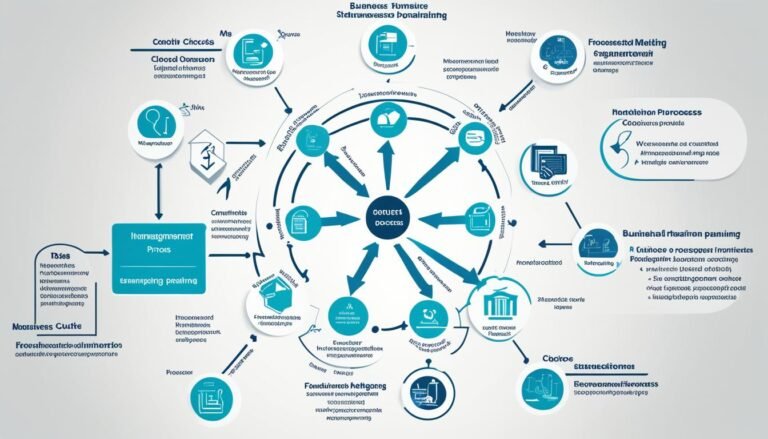What defines the role of a manager in a modern organization?
Managers in today’s organizations do more than check off tasks. They’re now in charge of not just work, but their team’s feelings and health.
Being a good manager today means being an empathetic leader. It means really listening and making smart decisions that consider your team’s emotions.
The role of a manager in modern times is more complex. It’s about knowing your team inside out and leading with your heart and mind. Let’s look at what today’s managers really have to do.
Key Takeaways:
- Managers in modern organizations are responsible for understanding the emotions and well-being of their team members.
- Effective managerial practices involve active listening, effective communication, decision-making, and emotional intelligence.
- The role of a manager includes defining the vision, making important decisions, determining resource needs, hiring the best talent, resolving conflicts, building trust, and possessing key leadership skills.
- Managerial roles can be categorized into different types based on the level of responsibility and scope.
- Radical flexibility in the modern work environment requires managers to lead with empathy and prioritize emotional well-being.
Defining the Vision
A manager’s job in a modern organization is key. They must set the company’s vision and mission, along with goals and ways to measure performance. A clear and inspiring vision gives everyone, from the team to the organization, a sense of direction. This makes sure employees are motivated and work together towards a shared goal.
To define a vision well, managers should ask for ideas from everyone involved, like employees and customers. This group effort makes the vision more rich and varied. It also makes all team members feel like they have a say and a stake in the company’s success.
“A vision without action is merely a dream. Action without vision just passes the time. Vision with action can change the world.” – Joel A. Barker
After the vision is set, it’s vital for managers to make clear goals that support it. Goals need to be SMART: Specific, Measurable, Achievable, Relevant, and Time-bound. This helps provide a roadmap for success and allows team members to see and celebrate progress.
Managers should also create a solid structure within the organization. This makes sure everyone knows their role and works well together. When tasks are clearly assigned and resources are well managed, the team can move efficiently towards the vision.
Measuring how well the team is doing is important for achieving the vision. Managers must choose the right key performance indicators (KPIs). These are measures that show if the organization is on its way to meeting its goals. Using KPIs helps spot areas that need work and guides decisions to keep growing and succeeding.
By doing all these tasks, like defining the vision and setting goals, managers lead their teams to success. Their commitment and leadership inspire and motivate everyone. This creates a strong sense of purpose and accomplishment within the team.
| Manager’s Role in Defining the Vision: | Responsibilities: |
|---|---|
| Clearly define the vision and mission of the company | Guide and inspire teams towards a common goal |
| Set SMART goals and objectives aligned with the vision | Provide a roadmap for success |
| Involve stakeholders in the vision-building process | Enrich the vision with diverse perspectives |
| Establish a strategic organizational structure | Clarify roles and facilitate effective collaboration |
| Measure performance using key performance indicators (KPIs) | Track progress and make data-driven decisions |
Making Important Decisions
Managers are key in making big choices for their firms. Daily, they must decide on things that will affect the company’s tomorrows. This includes thinking about where resources go, how strategies change, and other vital areas.
They need to think about what’s good for the company, not just for now but also later. They look at the good and the bad, consider risks, and think about the money side of things.
Matching choices with what the company believes in is crucial. They make sure their choices stay true to the firm’s deepest values. This keeps things steady and trust strong with everyone involved.
Even though other viewpoints and advice matter, the final say falls on the manager. They must look at all info, talk to those who matter, and imagine what could come from their choices. It takes sharp thinking, knowing how to decide, and experience in the field.
Choosing can be hard, especially with lots of options or lots of pressure. But good managers can keep cool, find the info they need, and choose well for positive results.
Key Factors in Effective Decision-Making
- Having clear goals: Understanding what you want helps with picking the best paths. Managers lead better when they and their team know what success looks like.
- Looking at information: Choosing based on solid facts and figures means fewer mistakes. Managers use data to make smarter choices.
- Listening to all concerned: Considering everyone’s needs helps in making decisions that fit all. This includes employees, clients, owners, and other relevant folks.
- Thinking about risks: Knowing what might go wrong and how bad it could be is essential. Managers think about what each plan could mean, including the bad stuff, and have plans ready.
- Being ethical: Doing what’s right and fair is part of a manager’s job. It keeps the company respected and in the game for the long run.
In summary, a manager’s job is filled with making choices for their company. They look out for its best, keep their choices true to its core, and follow a clear way to decide. This way, they help their team face challenges and reach goals.
References:
Smith, J. (2021). Decision-Making in the Workplace: A Practical Guide. Business Publishing.
Anderson, M. (2020). Ethical Decision Making in Organizations: Strategies for Effective Leadership. Wiley.
Determining the Resources Needed
Managers are key in figuring out what projects and operations need in a company. They handle the budget, decide how many staff are needed, and make sure all resources are ready. This helps the organization reach its goals.
Knowing how to manage budgets well is vital for managers. It allows them to spend money wisely. They watch expenses and earnings closely. This helps them decide where the money should go, making sure it goes where it’s most needed. They must understand budgeting and be good at looking at data to find the best ways to spend.
Deciding how much staff is needed is also very important. Managers look at how much work each team has. They figure out if they need to hire more people. They also consider what skills are needed for each job. This way, they make sure every team has the right help. This helps the teams to be more productive.
Not forgetting about supplies and equipment is also crucial. Managers make sure that the company has what it needs to work. This means planning ahead and talking to suppliers. They work to keep everything running smoothly, so projects and daily operations aren’t delayed.
Overall, figuring out what the company needs is a big job for managers. By being careful with the budget, looking at how many staff are needed, and not forgetting about supplies, they play a big part in getting things done. This is how they help the company succeed.
Hiring the Best Talent
Hiring the best talent is key for any manager. They need to find people who fit the company’s values and culture. This builds a strong team. The hiring process has many steps to find the best matches.
Managers must look at a candidate’s skills, experience, and education. They do this through interviews and reference checks. This helps choose people who will do well in the company.

Assessing Cultural Fit
Managers also look at how well a candidate fits the company culture. This is known as cultural fit. It means their beliefs and personality match the company’s values. Hiring for cultural fit helps create a positive workplace.
“The right culture fit can significantly impact employee satisfaction, productivity, and overall team performance.”
Managers ask questions in interviews to understand a candidate’s values. They learn about their work style and how they solve problems. This helps them make choices that match the company’s culture.
Creating an Effective Recruitment Process
Create a strong recruitment process to find the best talent. Define what skills are needed for the job. Write job descriptions that will attract the right people. Use different channels to reach them, like job boards and social media.
Use tools like skill tests and behavioral interviews. Also, have a standard list of questions for interviews. This makes sure each candidate is evaluated fairly.
A good recruitment process is fair and free from biases. It allows everyone a fair chance. It helps build teams that are diverse and innovative.
Resolving Conflict in the Workplace
Conflict happens often in work settings. Managers must know how to resolve it well. The key is to stay neutral, fair, and listen to everyone involved.
The Role of a Manager in Conflict Resolution
Managers sometimes must help team members resolve their issues. It’s important they don’t pick sides. This way, everyone involved feels respected and listened to.
Resolving conflicts in a timely and effective manner is essential for maintaining a positive work environment and fostering collaboration among team members.
For managers, being good at solving conflicts is a must. They need to listen well, talk clearly, show understanding, and help find solutions. These steps lead to better problem-solving and harmony.
Creating a Collaborative Environment
Managers should aim to foster a workplace where people communicate openly and work together. They can do this by making it easy for team members to give feedback and share their concerns.
It’s also about getting everyone to talk and find solutions together. This approach helps keep conflicts small and builds trust within the team.
Conflict Resolution Strategies
Managers can use different methods to tackle workplace conflicts:
- Active listening: Showing genuine interest and attentiveness can help defuse tense situations and facilitate understanding.
- Mediation: Bringing conflicting parties together to discuss their issues can lead to finding common ground and reaching a resolution.
- Problem-solving: Collaboratively identifying the root causes of the conflict and working together to find solutions.
- Empathy: Recognizing and acknowledging the emotions and perspectives of all individuals involved in the conflict.
- Conflict prevention: Establishing clear expectations, communication protocols, and conflict resolution procedures can help prevent conflicts from arising in the first place.
Building Trust Among Colleagues
Trust matters a lot as a manager. It’s key to teamwork. It helps everyone work toward the same goals and trust in each other. Let’s see how we can boost trust and improve teamwork:
- Lead by Example: Start by showing good leadership. Be honest, real, and clear. This earns trust and respect from others.
- Motivate and Empower: Great managers motivate their teams. They foster teamwork by supporting and guiding, making everyone feel their work is crucial.
- Establish a Clear Vision: Clear goals help build trust. When the team knows and believes in the vision, they trust the leadership and work together better.
- Effective Communication: Good communication is vital. Giving feedback and listening well makes everyone feel heard and valued. This boosts trust and teamwork.
- Show Empathy and Respect: Being kind and showing you care makes a big difference. It makes the workplace welcoming and builds strong bonds among the team.
“Trust is the glue of life. It’s the foundational principle that holds all relationships.” – Stephen R. Covey
Adding these tips to your leadership style can really help build trust. When teams trust each other, they are more united and achieve more. This leads to the overall success of the company.
Benefits of Building Trust:
There are many good things that come from trusting your team. Here are some of the top benefits:
- Enhanced collaboration and teamwork
- Increased job satisfaction and employee engagement
- Higher levels of productivity and innovation
- Reduced conflicts and improved problem-solving
- Retention of top talent and attraction of new talent
Example of Trust-Building Activities:
| Trust-Building Activity | Description |
|---|---|
| Team-Building Exercises | Engage the team in activities that promote collaboration, trust, and communication. |
| Mentoring and Coaching | Giving experienced team members a chance to help others. It builds trust and skills. |
| Open-Door Policy | Make it easy for everyone to share their thoughts and ideas. It builds a culture of openness. |
| Personal Development Plans | Help team members grow by creating plans that fit their personal and professional needs. This shows you care. |
| Recognition and Rewards | Appreciate and reward hard work. It makes everyone feel valued and trusted. |
By using these activities, you can make a space of trust and collaboration in your team. This leads to a place where everyone is happy and successful.
Top Skills of a Manager Fit for Leadership
Managers are key in leading their teams to success. To lead well, they need many skills for today’s business world. Let’s explore the main skills needed for leading.
1. Strategic Thinking
Strategic thinking means looking at complex issues and seeing the big picture. Good managers spot trends, make choices that match long-term goals, and lead the team towards success. They can take risks, notice chances, and adjust to changes, always keeping their eyes on the final goals.
2. Sensitivity to Different Perspectives
Good managers respect diversity in the workplace. They are aware of different views and backgrounds, making sure everyone feels listened to and valued. This kind of leadership helps create a culture that encourages innovation through the celebration of unique viewpoints.
3. People Development
Great managers focus on helping their team grow. They support and guide their employees, offering feedback and chances to learn and improve. This approach builds strong, motivated teams ready for any challenge.
4. Effective Communication
Well, managers need to communicate clearly to lead effectively. They should share what they expect, listen well, and keep misunderstandings low. Good communication encourages teamwork and boosts productivity.
5. Emotional Intelligence
People managers with great emotional intelligence can handle their feelings and understand their team’s emotions. This ability helps them build trust, solve problems, and lead with empathy. Emotional smarts are crucial for making decisions that take their team’s well-being into account.
“I believe that emotional intelligence is key to effective leadership. Understanding and responding to the emotions of others is crucial in building strong relationships and creating a positive work environment.” – John Maxwell
With these key skills, managers are well-prepared to lead confidently and make their organizations successful.
| Skill | Description |
|---|---|
| Strategic Thinking | The ability to analyze complex situations, identify trends, and make informed decisions that align with the long-term goals of the organization. |
| Sensitivity to Different Perspectives | Understanding and valuing diverse perspectives and backgrounds, creating an inclusive work environment that fosters innovation. |
| People Development | Mentoring, coaching, and providing opportunities for growth and learning to develop the skills and potential of team members. |
| Effective Communication | Clear and concise communication, actively listening to team members, and conveying expectations and information effectively. |
| Emotional Intelligence | Understanding and managing emotions, empathizing with team members, and building strong relationships based on trust. |
The Different Types of Managers
Managers are key in every organization, leading teams and ensuring success. Yet, their roles vary greatly. We have executive, middle, and first-line managers, each focusing on different tasks.
“The variety of manager types reflects the diverse needs and complexities of organizations today, allowing for specialization and effective leadership within specific domains.” – John Smith, Management Expert
1. Executive Managers
At the top are executive managers. They plan the organization’s big moves and long-term goals. These managers shape the vision and make choices that affect everyone.
2. Middle Managers
Middle managers sit between executives and first-liners. They make the big plans work at ground level. They ensure tasks point toward the organization’s aims.
3. First-Line Managers
First-line managers are right on the front line, overseeing daily work. They guide employees, set goals, and make sure tasks are done well. They’re crucial for getting things done every day.
4. Team Leaders
Team leaders focus on their specific group’s success. They make sure their team understands the bigger goals and encourage teamwork. With great people skills, they keep their team motivated.
All manager types have critical roles. By each focusing on their part, they help the organization meet its goals and lead effectively.
Radical Flexibility Requires Empathetic Managers
The way we work is changing a lot thanks to new flexibilities. These come from being able to work from other places and new technologies. Workers now value their time off and mental wellness more. Leaders who get this and care are so important. They make sure everyone is doing well, both in the team and the business.
Good managers understand and react to how their team members feel. They make the workplace a caring one, focused on talking openly, trusting each other, and being kind. By listening to their team, managers get to help with their problems and dreams. This makes work a better place for everyone.
For those working away from the office, empathy from their boss is extra crucial. Leaders must try to fill the gap by talking often, making everyone feel part of the team, and fighting loneliness. They make sure everyone working remotely has what they need and feels seen for their hard work.
“Empathy is about understanding. It’s about recognizing another person’s emotions and experiences, and responding with care and consideration. In a remote work setup, having empathetic managers is crucial to maintaining strong relationships and a positive team dynamic.”
Benefits of Empathetic Leadership
Caring leaders help in many ways. They boost team spirit, help people work together, and make the work space a happy one. When workers know their manager cares about them and their feelings, they work harder and enjoy their jobs more.
Empathy doesn’t just make people feel good; it makes them do better at their jobs too. Good bosses learn what their team needs and gives the right help, tools, and incentives. This boosts each person’s and the whole team’s efforts. It helps them win over challenges, learn more, and reach their targets.
Empathy is also great for making new ideas. When people feel safe and free to share what they think, they offer fresh ideas. A boss who listens and opens the door to all kinds of viewpoints helps the team grow. They bring out great new thoughts and help the company get better.
Implementing Empathetic Leadership
Managers grow their empathy skills by working on their self-awareness, listening carefully, and talking well. Managing involves knowing your own and your team’s feelings. And really hearing and understanding what everyone has to say helps a lot. Clear, honest communication is key.
Creating chances for the team to get together and talk helps too. This builds trust and deeper team bonds. Things like team events, virtual chats, or regular catch-ups make everyone feel part of something special. Wanting to listen and help out makes a manager someone everyone can count on.
Conclusion
The role of managers is changing because of things like remote work and new tech. They must now lead with empathy to be effective. Empathy means caring about how team members feel.
Empathetic managers are better at talking, making choices, and understanding people’s feelings. They can overcome problems, make their team happier, and push for better results. They know each team member’s goals and needs, creating a culture where people trust and help each other.
So, managers in today’s world need to lead in a new way by putting empathy first. This change leads to success at work. By supporting their teams and caring about their emotions, managers can make their organizations grow and be a great place to work.
FAQ
What defines the role of a manager in a modern organization?
In today’s workplace, a manager’s role has changed due to remote work and new tech. Instead of just focusing on tasks, they now care about their team’s feelings too. Being a good manager means leading with heart, not just orders.
How does a manager define the vision of a company?
Managers do more than just set goals; they craft the company’s vision. They get everyone, from employees to customers, involved. They also make sure the team is structured well to achieve these goals.
What are the responsibilities of a manager in making important decisions?
Managers are key decision-makers. They have to keep the company’s goals in mind when making choices. Though they get advice, the final call is theirs. They need to be quick thinkers and handle stress well.
How does a manager determine the resources needed for projects and operations?
They figure out what their team needs to get the job done. This includes setting budgets and finding the right people. Managers must understand finances and how to best use resources.
What is the role of a manager in hiring talent?
Hiring great people is vital. Managers are in charge of spotting the best and bringing them on board. They make sure these new hires fit in well with the company, helping the team grow stronger.
How does a manager resolve conflicts in the workplace?
Managers step in to solve team disputes. They do this by being fair and talking things out. They need strong people skills to find the best solution for everyone.
How does a manager build trust among colleagues?
To be a great leader, managers must earn their team’s trust. They motivate their team by sharing a clear vision. This means communicating well, offering help, and making everyone feel important. A trusting team is a strong team.
What are the top skills of a manager fit for leadership?
Good managers have many skills, such as thinking ahead and helping their team grow. They’re also great at talking and understanding others. These skills let managers guide their team well and make work a good place to be.
What are the different types of managers?
Managers come in different kinds, depending on their duties and level in the company. There are executives, middle managers, first-line managers, and team leaders. Each plays a key role in getting things done.
How does the modern work environment impact the role of a manager?
Today’s work world is different, with many working from home and using advanced tools. This means managers must be more caring and understand their team’s needs. A manager who listens, supports, and cares builds a team that does great work.
What is the evolving role of managers in modern organizations?
Managers today deal with new challenges like remote work and advanced technology. To succeed, they must connect with their team emotionally and build a positive workplace. By developing their communication and emotional intelligence, managers can lead effectively in our changing world.








